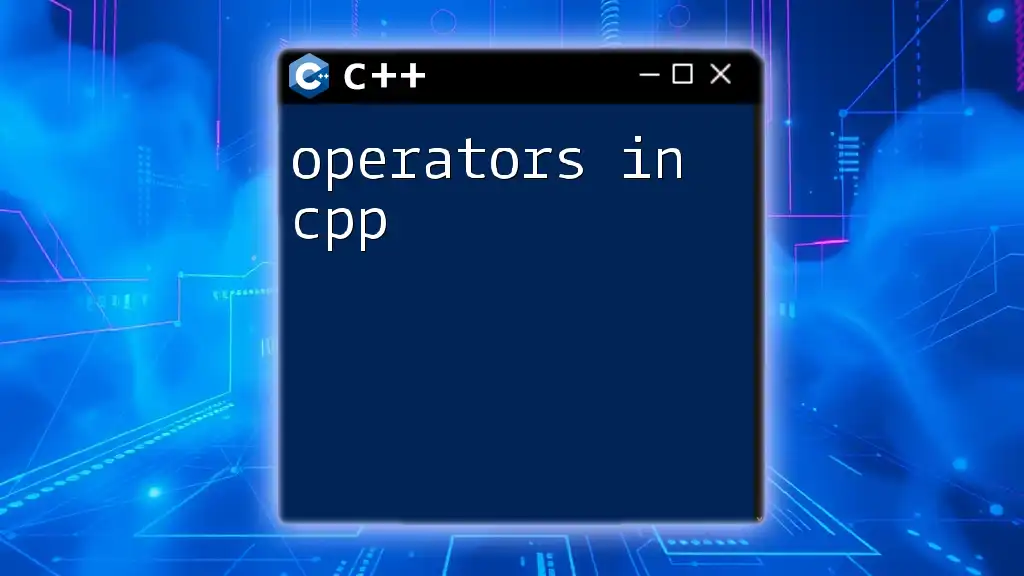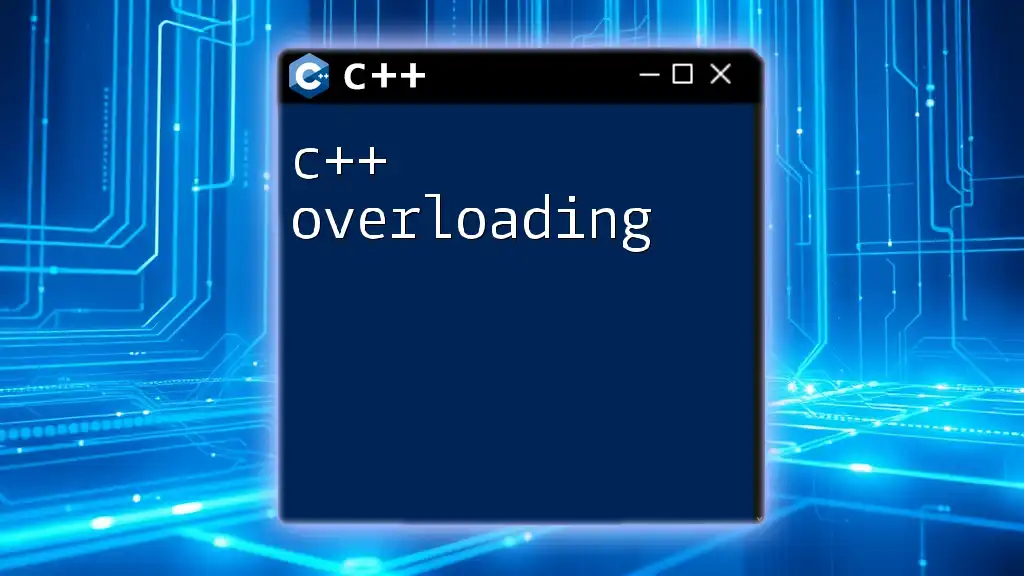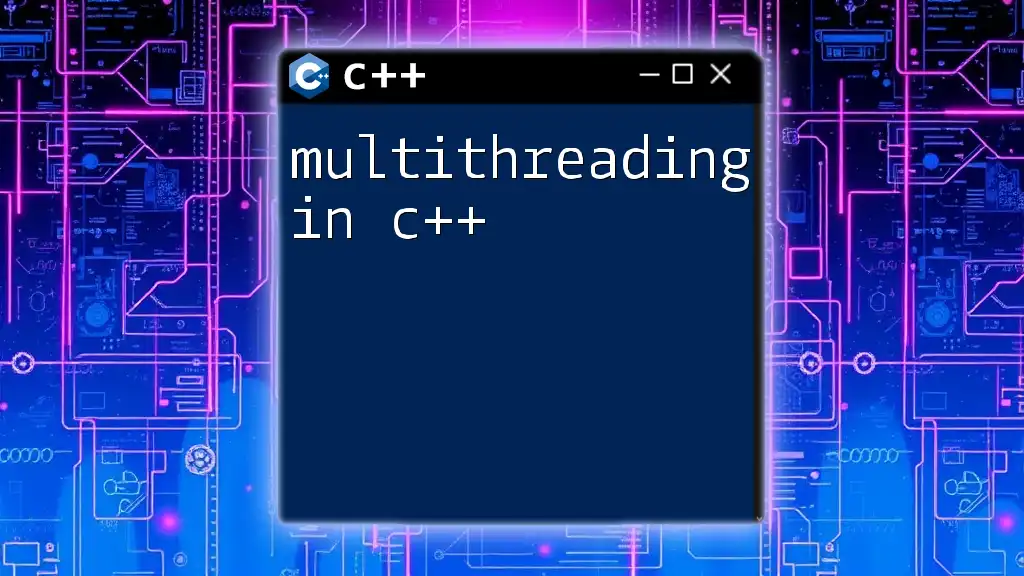Operator overloading in C++ allows developers to define custom behavior for standard operators (like +, -, etc.) when applied to user-defined types, enhancing code readability and usability.
Here's a simple example of operator overloading for a `Point` class:
#include <iostream>
class Point {
public:
int x, y;
Point(int x, int y) : x(x), y(y) {}
Point operator+(const Point& p) {
return Point(x + p.x, y + p.y);
}
};
int main() {
Point p1(1, 2);
Point p2(3, 4);
Point p3 = p1 + p2; // Uses overloaded + operator
std::cout << "p3: (" << p3.x << ", " << p3.y << ")\n"; // Outputs: p3: (4, 6)
return 0;
}
What is an Operator in C++?
In C++, an operator is a symbol that tells the compiler to perform specific mathematical or logical manipulations. Operators fall into various categories such as arithmetic, relational, logical, and bitwise.
While C++ comes with a comprehensive set of built-in operators, there are scenarios where existing operators may not be sufficient for user-defined data types. This is where operator overloading in C++ becomes invaluable.

The Need for Operator Overloading
Enhancing Code Readability
Operator overloading in C++ allows developers to create more intuitive interfaces by enabling operators to work with user-defined types. By overloading operators, the code can become clearer and more readable. For instance, consider two different ways to add two complex numbers:
Complex a(1, 2);
Complex b(3, 4);
Complex c = a + b; // Using overloaded operator
Versus:
Complex result = a.add(b); // Traditional method
The first approach with operator overloading is significantly more readable and aligns closely with mathematical notation.
Case Studies
In user-defined classes such as `Matrix` or `Complex`, operator overloading simplifies operations, allowing you to use standard mathematical symbols to perform operations without cumbersome function calls.

How to Overload Operators in C++
Syntax of Operator Overloading
The basic syntax for overloading an operator in C++ is as follows:
return_type operator symbol (parameter_list) {
// implementation
}
This syntax allows you to define how an operator behaves when applied to instances of your user-defined class.
Overloading Different Operators
Overloading Arithmetic Operators
One of the most common examples is overloading the `+` operator. Consider a `Complex` class that represents complex numbers:
class Complex {
public:
int real, imag;
Complex(int r = 0, int i =0) : real(r), imag(i) {}
Complex operator+(const Complex &obj) {
Complex temp;
temp.real = real + obj.real;
temp.imag = imag + obj.imag;
return temp;
}
};
Complex a(1, 2);
Complex b(3, 4);
Complex c = a + b; // Now uses the overloaded +
Overloading Relational Operators
You can overload relational operators such as `==` and `<` to compare objects of a class. For instance, in a `Box` class that compares the length of boxes:
class Box {
public:
int length;
Box(int l) : length(l) {}
bool operator==(const Box &b) {
return length == b.length;
}
};
Box b1(10);
Box b2(10);
if (b1 == b2) {
// Boxes are equal
}
Overloading Increment and Decrement Operators
Overloading the increment (`++`) and decrement (`--`) operators can also produce elegant class interactions. Here's a basic example:
class Counter {
public:
int count;
Counter(int c = 0) : count(c) {}
Counter operator++() { // Pre-increment
return Counter(++count);
}
};
Operator Overloading Functions
Member vs Non-Member Functions
Operators can be overloaded as member functions or as non-member functions (friend functions).
- Member Function: If the left operand is an instance of the class, the operator is typically defined as a member function.
- Non-Member Function: If the left operand is not an instance of the class (for instance, if you want to have a binary operator), the operator should be defined as a non-member function.
Example for a non-member function:
Complex operator+(const Complex &c1, const Complex &c2) {
return Complex(c1.real + c2.real, c1.imag + c2.imag);
}
Friend Functions
Using friend functions is beneficial when you need to access the private members of a class directly. Here’s how you can overload the `+` operator using a friend function:
class Complex {
public:
int real, imag;
Complex(int r, int i) : real(r), imag(i) {}
friend Complex operator+(const Complex &c1, const Complex &c2) {
return Complex(c1.real + c2.real, c1.imag + c2.imag);
}
};

Rules and Best Practices for Overloading Operators
General Guidelines
- Only overload operators where the meaning is clear and well-defined.
- Keep the semantics of an operator intuitive and consistent with built-in types.
- Not all operators should be overloaded; avoid overloading operators that might result in confusion or ambiguity.
Consistency in Overloading
Consistency is key when it comes to operator overloading. If you overload the `+` operator to mean addition for two objects, it should behave as expected and not perform any unexpected operations. Good examples follow intuitive logic, while poor examples can mislead users of your API.

Examples of Operator Overloading in C++
Complete Example: Overloading Multiple Operators
Consider a `Vector` class that implements various overloaded operators:
class Vector {
public:
int x, y;
Vector(int x, int y) : x(x), y(y) {}
Vector operator+(const Vector &v) {
return Vector(x + v.x, y + v.y);
}
bool operator==(const Vector &v) {
return (x == v.x && y == v.y);
}
};
This example allows you to create vectors and add them using the `+` operator, as well as compare them using the `==` operator.
Practical Example: Implementing a Fraction Class
Here’s a practical example using a `Fraction` class that supports overloaded operators:
class Fraction {
private:
int numerator, denominator;
public:
Fraction(int num, int denom) : numerator(num), denominator(denom) {}
Fraction operator+(const Fraction &f) {
return Fraction(numerator * f.denominator + f.numerator * denominator, denominator * f.denominator);
}
bool operator==(const Fraction &f) {
return (numerator * f.denominator == f.numerator * denominator);
}
};
This class allows you to add fractions using the overloaded `+` operator and compare them with the `==` operator.

Conclusion
Operator overloading in C++ is a powerful feature that enhances the readability and usability of user-defined data types. By leveraging this capability, developers can create intuitive and clear code that closely resembles mathematical expressions. It is essential, however, to apply best practices and maintain consistency to avoid confusion. As you explore operator overloading, practice with various data types and see how this feature can simplify your code and improve its clarity.

















